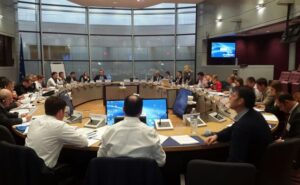
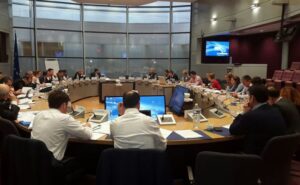
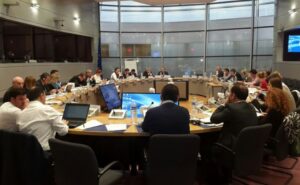
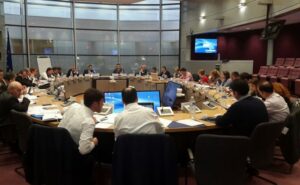
The discussion is held in the framework of the Stabilisation and Association Process Dialogue. The discussion covered a wide range of topics, such as enhancing import controls on food and animals, strengthening food safety inside Kosovo, systematisation of data entry into the animal identification, registration and movement database, agriculture import and export statistics, and the performance of Kosovo’s institutions responsible for agriculture and food safety.
The discussions at the Stabilisation and Association Process Dialogue meeting concluded that, in matters of animal health and food safety Kosovo’s legislation has set a good basis to apply EU standards, but Kosovo needs to make further efforts to apply these standards such as the forthcoming transfer of inspectors from municipalities to central Food and Veterinary Agency and the development of a rendering plant for animal by-products. In addition, farmers need to be encouraged to register animal movements, births and deaths so that animal diseases can be more efficiently fought and food of animal origin can be traced.
This is also in the interests of farmers themselves.
Kosovo’s consumers deserve to eat food of the same safety and quality as the citizens of the European Union. The Commission outlined that for this to happen, EU standards need to be applied at all levels: in the control of imports and exports, in the registration of animals, in what practices are allowed in growing food, in the way that food is processed, and then labelled and sold. A number of control bodies are involved in guaranteeing those standards: health officials, inspectors, veterinarians, laboratories. These have all been set up in Kosovo and are in the process of enforcing EU standards. The discussions agreed that food operators, whether farmers or food processers, also need to change their established practices to meet these standards, and that Kosovo’s efforts to convince their operators are therefore key.
The discussions – where participants conveyed also Civil Society Organisations key messages – also examined Kosovo’s support to Agriculture, including coupled payments for certain produce, and a rural grants scheme to help farmers and operators upgrade to EU standards. These limited schemes have been successful and will be expanded as Kosovo increases the proportion of its budget dedicated to agriculture and food production. There were also discussions on a number of sectors, such as Kosovo’s nascent organic agriculture and wine sector.
Forestry was also extensively discussed, as Kosovo attempts to balance the economic benefits from such an extensive resource with the need to preserve these forests for the future. The Commission underlined that forest exploitation should be carried out in a sustainable way, which also means controlling illegal cutting. Kosovo is attempting to address this through a variety of strategies and action plans, at both national and municipal level.
The meeting considered how best to focus EU assistance to this sector. Agriculture and Food Safety has benefited from substantial assistance so far, notably in the EU’s contribution to the rural grants scheme, and this priority will continue in the future.
Background information
The SAP Dialogue is a framework under which the European Union and the Kosovo administration regularly discuss technical and policy issues in relation to the European agenda. The SAP Dialogue monitors and accompanies Kosovo’s delivery on reforms, and identifies how the EU can assist in this process. Sectoral and plenary SAP Dialogue meetings are co-chaired by the European Union and the government. Each meeting results in jointly agreed follow-up actions to be taken by the Kosovo authorities.
There are seven areas covered in sectoral meetings and they follow closely the format of the dialogue that the EU has with other candidates and potential candidates. These seven sectors are:
– Justice, Freedom and Security
– Innovation, Information Society, Social Policy, Education and Culture
– Trade, Industry, Customs and Taxation
– Internal Market, Competition, Consumer and Health Protection
– Agriculture, Fisheries, Forestry, Food Safety
– Transport, Environment, Energy, Regional Development
– Economic and Financial Issues, Statistics
The time between the meetings allows for the implementation of the recommendations and agreed follow-up actions. A plenary meeting, where the reform priorities will be discussed, is expected to take place in July 2015. The conclusions of the meetings are public and available on the EU Office’s website and http://www.mei-ks.net.
For more information contact:
European Union Office
Fatmire Terdevci, 038 5131 517
Ministry for European Integration
Flamur Salihu, 044 344 210
Last modified: August 12, 2022
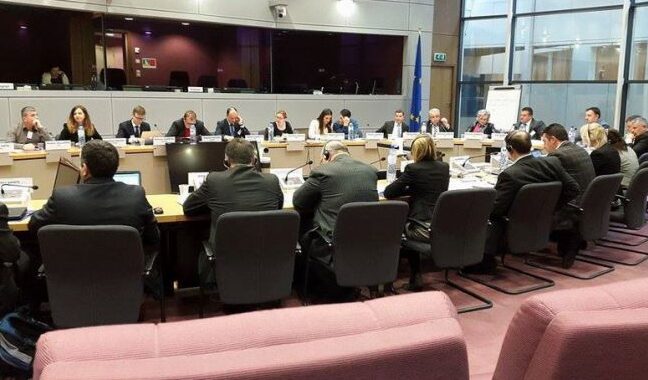










… [Trackback]
[…] There you can find 3293 more Information on that Topic: integrimievropian.rks-gov.net/en/kosovo-and-eu-discuss-agriculture-forestry-fisheries-and-food-safety-2/ […]
… [Trackback]
[…] Info to that Topic: integrimievropian.rks-gov.net/en/kosovo-and-eu-discuss-agriculture-forestry-fisheries-and-food-safety-2/ […]
… [Trackback]
[…] Read More here on that Topic: integrimievropian.rks-gov.net/en/kosovo-and-eu-discuss-agriculture-forestry-fisheries-and-food-safety-2/ […]
… [Trackback]
[…] Here you will find 56146 additional Information on that Topic: integrimievropian.rks-gov.net/en/kosovo-and-eu-discuss-agriculture-forestry-fisheries-and-food-safety-2/ […]
… [Trackback]
[…] Information to that Topic: integrimievropian.rks-gov.net/en/kosovo-and-eu-discuss-agriculture-forestry-fisheries-and-food-safety-2/ […]
… [Trackback]
[…] Here you can find 13982 more Information to that Topic: integrimievropian.rks-gov.net/en/kosovo-and-eu-discuss-agriculture-forestry-fisheries-and-food-safety-2/ […]